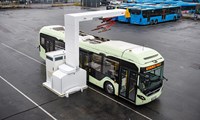
Keolis and Volvo have demonstrated the operation of a 12m long electric bus at the Keolis depot in Gothenburg, Sweden, which is able to autonomously manoeuvre, drive and park itself when charging or washing is required.
Using software developed by Volvo, the bus is controlled and monitored from a control room. Automating the operations performed in the bus depot aims to reduce the time the buses have to spend there, which is said to increase the fleet availability, as well as allowing for the size of the depot to be reduced.
It is also said to minimise the risk of collisions, optimise safety and enable the bus to come to the driver, rather than the driver going to the bus. Volvo has however stressed that this is less about replacing humans than it is about improving efficiency and safety.
“This marks a very important step in our autonomous journey, as we now have successfully shown the commercial benefits an autonomous solution can deliver in a bus depot,” noted Volvo Buses President, Håkan Agnevall. “Autonomous buses in depots bring new benefits, such as more efficient traffic flows, higher productivity, [fewer] damages, and improved safety.”
Keolis has been testing autonomous shuttles since 2016 with its partner Navya. Since then, Keolis has started operating autonomous shuttles in other cities in France including Paris, Rennes and Lille as well as in the UK, Australia, Canada, the U.S. and Belgium.
Volvo has also carried out a number of autonomous bus demonstrations in the past, but this demonstration was reportedly among the first to take place in a real bus depot.
The bus is not considered ready for full deployment, and neither Volvo or Keolis has indicated when the bus might be rolled out to working depots. But the trial aimed to provide evidence that autonomous transport can be used in industry-specific cases.
“We are still many years away from seeing fully autonomous buses on public roads, but since bus depots are confined areas with predictable and repetitive traffic flows, we see autonomous buses being used there much sooner,” Agnevall said.
About Intelligent Transport
 Serving the transport industry for more than 15 years, Intelligent Transport (formerly Eurotransport) is the leading source for information in the urban public transport sector. Covering all the new technologies and developments within this vitally important sector, Intelligent Transport provides high-quality analysis across our core topics: Smart Cities, Digitalisation, Intermodality, Ticketing and Payments, Safety and Security, The Passenger, The Fleet, Business Models and Regulation and Legislation.
Serving the transport industry for more than 15 years, Intelligent Transport (formerly Eurotransport) is the leading source for information in the urban public transport sector. Covering all the new technologies and developments within this vitally important sector, Intelligent Transport provides high-quality analysis across our core topics: Smart Cities, Digitalisation, Intermodality, Ticketing and Payments, Safety and Security, The Passenger, The Fleet, Business Models and Regulation and Legislation.




Comments
There are no comments yet for this item
Join the discussion